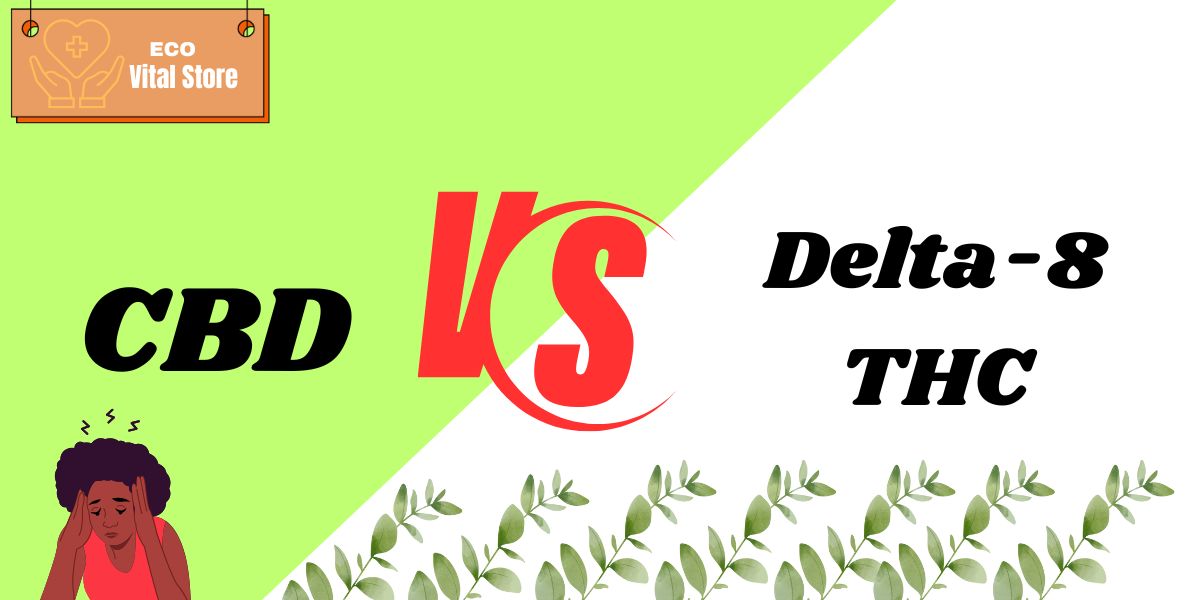Cannabis-based compounds have received a lot of attention for their therapeutic applications. CBD and Delta-8 THC are two of the most notable cannabinoids in this regard. Although similar in many ways, they also have some differences in effects, legality, safety, and production process. In this article, we will explore an in-depth comparison of CBD and Delta-8 THC in an attempt to give you an informed choice regarding their consumption.
What Is CBD?
CBD is a non-psychoactive compound found abundantly in hemp and cannabis plants. Unlike its more famous counterpart, Delta-9 THC, CBD does not produce a “high.” It interacts with the body’s endocannabinoid system (ECS) to promote balance and well-being.
Potential Benefits of CBD:
- Anxiety and Stress Relief: CBD may help reduce anxiety by interacting with serotonin receptors in the brain.
- Pain Management: Its anti-inflammatory properties can assist in alleviating chronic pain.
- Sleep Improvement: Some studies suggest CBD can improve sleep quality by addressing factors like anxiety and pain.
- Neuroprotective Effects: CBD is being explored for its potential in treating neurological disorders like epilepsy.
Safety Profile:
CBD is typically safe, with minor side effects including dry mouth, sleepiness, and altered appetite. Nevertheless, it’s always important to talk to a medical provider before taking any new supplement course of action.
What Is Delta-8 THC?
Delta-8 THC is a cannabinoid present in minuscule quantities within marijuana plants. It is closely related to Delta-9 THC but with minute variations in their molecular structures, hence less potent psychoactive effects.
Potential Benefits of Delta-8 THC:
- Mild Euphoria: Users report a less intense high compared to Delta-9 THC.
- Appetite Stimulation: Like Delta-9, Delta-8 can increase appetite.
- Anti-Nausea Effects: It may help reduce nausea and vomiting, particularly in chemotherapy patients.
- Pain Relief: Delta-8 has shown potential in alleviating pain and inflammation.
Safety Concerns:
Delta-8 THC is often synthesized from CBD in laboratories, leading to concerns about the presence of residual solvents and chemicals. Additionally, the lack of regulation in its production can result in inconsistent product quality.
CBD vs Delta 8 THC: Key Differences
| Feature | CBD | Delta-8 THC |
|---|---|---|
| Psychoactive | No | Yes |
| Legality | Federally legal (with <0.3% THC) | Varies by state; legal ambiguities exist |
| Production | Extracted directly from hemp | Synthesized from CBD |
| Drug Testing | Unlikely to cause a positive result | May cause a positive result |
| Side Effects | Mild | Mild to moderate |
Legal Status: Delta 8 vs CBD
The legal landscape for CBD and Delta-8 THC varies significantly:
- CBD: The 2018 Farm Bill legalized hemp-derived CBD products containing less than 0.3% Delta-9 THC at the federal level. However, individual states may have their own regulations.
- Delta-8 THC: While Delta-8 THC exists in a legal gray area, some states have explicitly banned it due to its psychoactive properties and concerns over unregulated production.
It’s crucial to check local laws before purchasing or using Delta-8 THC products.
Safety and Side Effects
CBD:
- Common Side Effects: Dry mouth, drowsiness, changes in appetite.
- Serious Concerns: Rare, but may interact with certain medications.
Delta-8 THC:
- Common Side Effects: Red eyes, dry mouth, increased appetite, temporary memory changes.
- Serious Concerns: Potential for increased heart rate, anxiety, and impaired motor skills. The unregulated nature of its production raises concerns about contaminants.
Drug Testing Considerations
- CBD: Standard drug tests are designed to detect Delta-9 THC and are unlikely to identify CBD. However, full-spectrum CBD products may contain trace amounts of THC, which could potentially cause a positive result.
- Delta-8 THC: Due to its structural similarity to Delta-9 THC, Delta-8 can trigger a positive result on drug tests, even in states where marijuana is legal.
Choosing Between CBD and Delta-8 THC
Your choice between CBD and Delta-8 THC should depend on your individual needs and circumstances:
- Opt for CBD if: You seek therapeutic benefits without psychoactive effects, have concerns about drug testing, or prefer a product with a well-established safety profile.
- Opt for Delta-8 THC if: You desire mild euphoria, appetite stimulation, or anti-nausea effects, and are aware of the legal3
- and safety considerations.
Conclusion
CBD and Delta-8 THC are both cannabis-derived cannabinoids with distinct benefits and implications. CBD has long been identified as the non-intoxicating, therapeutic cannabinoid, while Delta-8 THC offers a less intense version of Delta-9 THC and its proposed benefits but attached risks as well. Knowing their differences, legality, and safety profiles allows you to make the best decision on which cannabinoid best fits your goals for health and wellness.
Always seek the advice of a health professional prior to adding new cannabinoids or supplements into your regimen, particularly if you are suffering from underlying medical conditions or other medications.
Get the Product
| S. NO | Product Name | Uses |
|---|---|---|
| 1. | SlimJaro Price | For Weight Loss |
| 2. | Supra KETO BHB ACV Gummies Price | For Weight Loss |
| 3. | Fitspresso Weight Loss Supplement Price | For Weight Loss |
| 4. | Vigorlong Price | For Male Power |
| 5. | ErectoninMD Male Enhancement Price | For Male Power |

